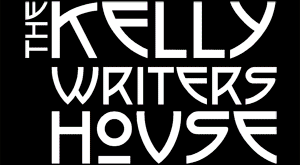



Simone White, whose work as poet, teacher, art critic, theorist, and performer has achieved international recognition, has been named Associate Faculty Director of the Kelly Writers House. She has been closely affiliated with the Writers House since she joined the Penn faculty in 2018 and now joins Faculty Director Al Filreis, Director Jessica Lowenthal, and the staff, faculty, and students at 3805 Locust Walk in this new role.
As Associate Faculty Director, Professor White will work with her colleagues at the House to help develop new program series, focusing especially on interarts programming, encouraging the evolution of events and projects that benefit from the convergence of music, visual arts, poetics, sound studies, theory, and performance. With Professor Filreis she has taught the Kelly Writers House Fellows seminar—an annual program featuring three eminent writers who make extended visits to the House and to the class—and will continue to plan the visits of upcoming Fellows. With Filreis and others, she will participate in planning for the future of the Kelly Writers House as this uniquely capacious open house for writers on Penn’s campus prepares to celebrate its first thirty years in May 2026.
“Simone has already been an active and much admired member of the Writers House community,” writes Al Filreis. “Teaching the Writers House Fellows seminar with her has been a dream. She is a truly great poet, has both natural and deeply learned instincts as a project- and event-maker, and leads in the most collaborative and conscientious way.”
Simone White is the author of Warring (forthcoming from Duke University Press), or, on being the other woman (Duke University Press, 2022), Dear Angel of Death (Ugly Duckling Presse, 2018), Of Being Dispersed (Futurepoem, 2016), and House Envy of All the World (Factory School, 2010), the poetry chapbook, Unrest (Ugly Duckling Presse, 2013), and the collaborative poem/painting chapbook, Dolly (with Kim Thomas) (Q Ave, 2008). Her poetry and prose have been featured in Artforum, e-flux, Harper’s Magazine, BOMB Magazine, Chicago Review, Poetry, and The New York Times, among other places. Her honors include the 2023 Dorothea Tanning Award from the Foundation for Contemporary Arts, a 2021 Creative Capital Award, and a 2017 Whiting Award in Poetry.
A graduate of Wesleyan University, Professor White holds a JD from Harvard Law School, an MFA from the New School, and a PhD in English from CUNY Graduate Center. She was raised in the Mt. Airy section of Philadelphia, about which she has written compellingly especially in her most recent poems.
“It’s such an honor to help steward this completely singular institution,” notes Professor White. “The Writers House has a legacy of celebrating literature as a form of gathering together, an ethic I share as a teacher and a poet. I look forward to working with Al, Jessica, and the staff of Kelly Writers House to share our joy in studying and making literary art with students, the wider Penn and Philadelphia communities, and visitors from all over the world.”
Since joining Penn’s English department, Professor White has taught graduate and undergraduate literature courses on Writing about Music, What Is Poetics?, W.E.B. DuBois, and creative writing workshops on Poetry Writing and Experimental Writing. She currently holds the rank of Associate Professor. She has been a member of the Kelly Writers House Advisory Board since 2020.
We here at 3805 Locust Walk are thrilled about a recent article describing and celebrating the talents and achievements of Wes Matthews. Please take a few moments to read the piece and be amazed! HERE it is.
Monday: 10 AM – 11 PM
Tuesday: 10 AM – 11 PM
Wednesday: 10 AM – 11 PM
Thursday: 10 AM – 11 PM
Friday: 10 AM – 5 PM
Saturday: noon – 5 PM
Sunday: 6 PM – 11 PM